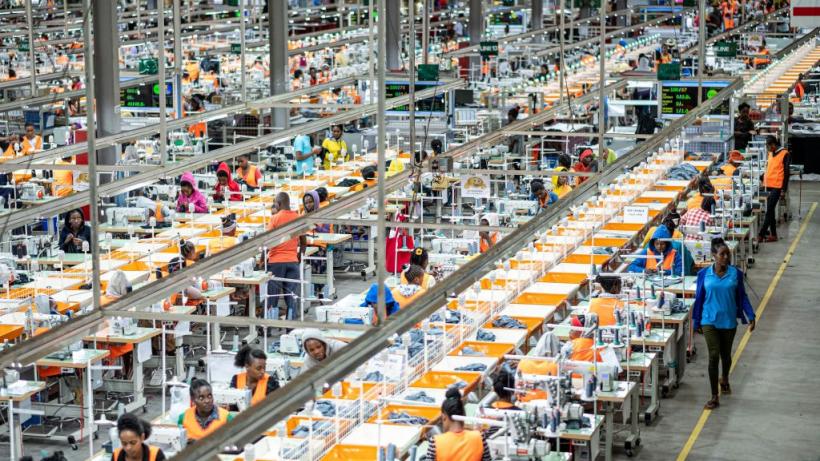
Africa Industrialization Week 2020: Policies for the future
Accelerating economic transformation and industrialisation is vital to create jobs, raise incomes, and reduce poverty in Africa. Industrialisation and international trade are critical drivers of this process. Combined with recommendations from three industrialisation experts we spoke with, we propose three complementary policy recommendations in advancing these objectives.
1. The agro-processing sector is a key part of the industrialisation strategy and important for the development of regional agro-value chains and job-led industrialisation.
Agro-processing should be our number one priority for industrialisation in Africa, for reasons that include abundant land, a young workforce, a growing consumer market, and a sector that is protected from global value chains.- Dr Carlos Lopes, University of Cape Town
In the face of automation, digitalisation, and COVID-19 potentially accelerating the reshoring of Global Value Chains (GVCs), solely focusing on developing a manufacturing sector to plug into global markets may not be the most effective route to widespread job creation. The agriculture sector remains the main source of economic activity, jobs, and livelihood in many African countries. Thus, an agricultural-based industrial policy can offer opportunities for export-led industrialisation that leads to value addition and job creation. Though manufacturing has been historically championed as the engine of economic transformation, the link between the agriculture sector and industrialisation is crucial and understated. The rationale for investing in the domestic agro-processing sector and increasing agricultural productivity, creating jobs, raising rural incomes, and developing agricultural value chains is strong, particularly post-COVID-19. Country-specific industrial policies can be developed and tailored to incentivise domestic and foreign investment towards local small-holder producers and include trade policy instruments that encourage participation of firms in Regional Value Chains (RVCs). The backward and forward linkages in the agriculture value chains are largely unlinked to the GVCs. Thus, pursuing agro-processing permits appropriate integration of RVCs, and subsequently the African Continental Free Trade Area (AfCFTA), without over-specialisation that is caused by GVCs.
2. Producing essential goods for the domestic market to reduce the impact of supply-chain disruptions.
The global supply-chain disruptions is seen as a window of opportunity for industrialisation in Uganda. There is an opportunity for import substitution on essential goods. But production should be focused on a few local essential goods and governments should combine this strategy with a clear export competitiveness goal. - Max Walter, Centre for Development Alternatives
The COVID-19 pandemic has shed light on the over-reliance of African economies on global supply chains and the impact on the supply of intermediate and essential goods. Governments can develop short-to-intermediate strategies to create/promote sectors that produce essential goods primarily for African markets, thereby substituting for the goods that were imported. This can reduce the reliance on essential imports from developed countries, particularly relevant if their trade policy becomes more restrictive. Accessing GVCs still appears as one of the most promising routes to economic development, and should remain the main strategy for countries to diversify and industrialise. Thus, fostering a vibrant and export-led local manufacturing sector that can integrate into the global economy requires a broad-based industrial policy that includes incentivising investments (both domestic and foreign) in human capital, infrastructure and improving the business environment.
3. Advancing continental integration and digitalisation
Continental integration can be a key driver of industrialisation and inclusive growth. Stronger integration should allow Africa to develop the RVCs and economies of scale that are necessary to compete in global markets. Building prosperity at a regional and continental level will also lessen Africa’s exposure to global markets, allowing the continent to take more control of its development agenda. Digitalisation can help accelerate this process, by adding efficiencies to cross-border trade and production.
One first step towards this goal is ensuring the successful implementation of the AfCFTA. The agreement will make substantial progress in fostering cross-border trade linkages and could create a more effective platform for pan-African dialogue and cooperation. Currently, there is substantial variation in the level of the integration across and within different regional economic communities in Africa. Developing more seamless cooperation across national borders should lead to efficiencies in many aspects of public policy – a stark example being the COVID-19 response. Developing intra-industry linkages within regional blocs can drive industrialisation, which need to be planned and coordinated at regional levels.
An intra-industry and value chain plan is important to ensure adequate redistributive effects arising from AfCFTA’s implementation. -Bogolo Kenewendo, Former Minister of Investment, Trade and Industry, Botswana
Digitalisation presents further opportunities for Africa to enable cross-border trade. Improving border processes, digital payments, and increasing manufacturing productivity, can all support growth and trade on the continent. To achieve this, investments in digital skills, internet access and support regulatory frameworks are required, all of which can be achieved at scale using AfCFTA.
By encouraging continental integration and economic diversification, Africa can hope to create a vibrant market of both producers and consumers within the continent. For example, by producing essential goods domestically rather than importing, and dampening the impact of volatile commodity prices and financial flows. This will require a broad and complementary industrial policy, as described above, which can reduce Africa’s vulnerabilities with respect to the global economy and create prosperity.
Read our other blog for Africa Industrialization Week 2020, which looks at industrialisation trends and the impact of COVID-19 on industries, trade, and supply chains here.

